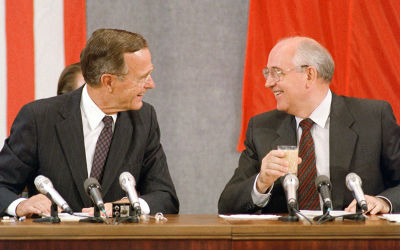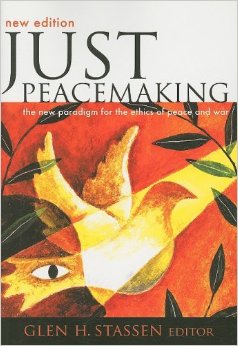‘Just Peacemaking’ – The Possible Dream
By Neil Earle
 Glen Stassen
Glen StassenIn last week’s message we drew attention to the work bring done by the colleagues of the late Glen Stassen, my ethics professor at Fuller Seminary in the 1990s. In light of all the fear and worry and punditry surrounding the US-Iranian nuclear talks, it is good to recall how Glen and his team spelled out alternative proposals to many of the roadblocks to peacemaking that bombard us on the national news.
The sweetener for even non-Christians in Glen’s book Just Peacemaking: the new paradigm for the ethics of peace and war is the tie-in with biblically-based initiatives that have worked in the world of politics and international relations. These realistic peace-making principles Jesus Christ gave us are expressed most concisely in the Gospels. Last time we listed five of them:
First, nonviolent direct action – “Go to your brother if you have a grievance” Jesus advised, but go humbly before the dispute draws others in (Matthew 18:15). Here is a foundational primer for all difficult relationships, either landlord to tenant or nation to nation.
 U.S. president George H. W. Bush and Soviet premier Mikhail Gorbachev
U.S. president George H. W. Bush and Soviet premier Mikhail GorbachevSecond, create independent initiatives for peace. Matthew 5:25 urges “agree with your adversary quickly.” Soviet and American leaders Gorbachev and Bush applied this principle between the crucial years 1989 and 1993 and it worked. They cut 50% of each nation’s nuclear arsenals. They were both looking for openings to end the arms race.
Third, work for cooperative conflict resolution. President Sadat did this in approaching Israel first in 1977. The resultant Camp David Accords have held. Think of Abraham offering Lot the choice land in Genesis 13 to avoid a range war. Remember how Jesus taught beautifully God’s desire for reconciliation with his wandering people by using the analogy of a mother hen and her chicks (Luke 19:41-44). This is empathy and it reduces tensions so that real progress can emerge.
Fourth, open acknowledgments of responsibility for conflict and injustice. At a Sarajevo seminar in 1995 a Muslim iman confessed how God had opened his eyes to at least begin to understand that Serbian hatred against his people stemmed from hundreds of years of Ottoman domination. This honest confession got talks going in a new direction. It followed Jesus’ principle of removing the beam from one’s own eye before pulling the splinter from another’s (Matthew 7:3-4).
Fifth, explore grass-roots initiatives towards liberty, human rights and internal power-sharing. President George W. Bush reminded us that democracies tend not to fight each other. Yes, the democratic process is often messy and exasperating but it is better than war. “Ballots not bullets,” we say. Wars often come about when nations seek to divert attention from their own internal problems as did the Argentine dictators when they grabbed the Falkland Islands in 1982. It failed. But at almost the same time the little Catholic electrician, Lech Walesa, used his labor union Solidarity to force genuine change in Poland and found the Polish Pope a shrewd and tenacious ally. When churches teach Jesus’ trenchant parables such as the Good Samaritan it keeps alive the higher values of peacemaking tied to resolving poverty and injustice.
That’s where we left off last time. Now let’s move forward with at least three other principles from the just peacemaking playbook.
“The Economy, wise man”
Sixth, where possible, foster equitable and sustainable economic development. Water rights, for example, are a constant sore spot between Israelis and Palestinians. But Palestinians, Israelis and Jordanians are presently working on conservation projects to save the Jordan River and desalinate parts of the Dead Sea. International project-sharing can work wonders as the often unnoticed St. Lawrence Seaway between Canada and the United States has shown since 1959. The world’s longest internal waterway speeds prosperity through faster transit for both countries. It’s so successful it never makes the news!

Today, the cry for economic security is a given. Jesus said the poor would be with us always, yes, but many of his parables are scathing indictments of unjust economic practices and the unequal distribution of resources (Luke 12:18). This should make Christians pay attention when decisions are being made in the board room and the cabinet room and the staff-room or voiced in the local diner.
In developed countries, with space becoming a premium, one town’s waste disposal facility may be another’s toxic health hazard. Erin Brokovich played to this some years back and the American West is rife with land disputes. But “love your neighbor” is one of the main planks of Jesus’ peace and justice manifesto (Luke 4:14-21). There is much reserve power to be tapped when these principles are diplomatically and tactfully echoed at city planning meetings or at international trade events. Land reform initiatives alone helped set Taiwan and South Korea on the path to prosperity.
Human beings often find out the hard way that violation of these themes bounces back on the often unwitting agents of economic injustice. Just recently, leakage from stored oil in abandoned mines backfired on over-zealous oil firms.
Related to this is the call for local support of cooperative initiatives that spill over into the international arena. Historically, argues Stassen, “the more nations are involved in travel, missions and international trade, the less they make war.” The United States and China showed the value of beneficial cultural exchanges during the famous Ping Pong Diplomacy of the early 1970s. This led to much greater things, as we know. By the 1980s our own denomination was involved. We helped sponsor the musical troupe “Little Ambassadors of Shanghai” to the United States in 1985 and the effect was electrifying and unforgettable on all involved. The “takeaway” was: Peace is possible and worth working for. In sowing seeds with young people, one can never predict the outcome.
Christians must take the lead in breaking down evil stereotypes and misassumptions e.g. targeting Muslims. Don’t look for the small chip in another’s person’s eye, said Jesus. Pay much more attention to your own blind spots. “Our own sin is always partly the cause of the sins against which we must contend,” concluded theologian Reinhold Niebuhr.
So in general, where possible, be alert to strengthen international efforts for global cooperation. Many churches do “think internationally.” Professor Paul Schroeder cites Jesus’ shrewd counsel to be “as wise as serpents and harmless as doves” (Matthew 10:16). We have to be aware of the world crises that touch upon us in our daily lives and their potential for evolving in positive or negative directions. Though it is far from a perfect model, nations more engaged in the United Nations, for example, tend not to attack each other as easily. As Winston Churchill said, “The United Nations was not intended to lift us to heaven but to save us from hell.”
The overall hope is to sustain Christian-themed moves toward peace and justice by intelligently-presented reforms for proposed alternatives to knotty problems. Motivated Christians were front and center in the abolitionist movement of the 1700s, for example. “Samaritan’s Purse” tied to evangelist Franklin Graham earns respect for poverty relief efforts in the Two-Thirds world, representative of thousands of such agencies sometimes going on for centuries. Other Christians boycott burger stores that get their meat from countries abusing people and land. Some others lobby their local or Congressional legislators to take action on other activities set against human flourishing. Lobbying works. Jesus’ parable of the unjust judge applies here (Luke 18).
 Queen Noor of Jordan
Queen Noor of JordanSeventh, though it may seem far afield from the average congregation’s warrant, Church-goers at least should be aware of moves to reduce offensive weapons and the scandalous trade in armaments. The military sword cuts both ways, Jesus warned. It often harms its wielder more than its victims (Matthew 26:52). American-born Queen Noor of Jordan is one of 100 political leaders behind Global Zero, a new initiative to eliminate nuclear weapons – mainly the 26,000 still owned by Russia and the U.S. “The presence of nuclear weapons drives more proliferation and insecurity,” Queen Noor warns. It also exposes nuclear powers to the threat of hypocrisy when they try to curb “would-be” nuclear states.
When he said “count the cost” (Luke 14:28) Jesus advised us to tread carefully on hot-button issues. An arms race wrecks economies. In the mid-1980s, with his economy ailing, Soviet leader Mikhail Gorbachev made the strategic initiative to cut his tank forces in central Europe in half. The NATO powers replied by eliminating their medium and shorter-range nuclear missiles – a big big savings for all. This was the first step towards ending the Cold War itself. “Counting the cost” is as realistic as it gets. When the United States recently proposed upgrading all its nuclear warheads, a lobbying action by peaceaction.org stopped the proposal. Today, when experts worry about terrorists stealing a nuclear weapon, more creative attention is being brought on the entire nuclear issue. This fear can create renewed co-operation. The example of three former Soviet republics voluntarily turning over their nuclear arsenals to a multinational central authority in 1994 should not be forgotten.
Good things can happen. In this century, sixteen nations were persuaded to stop their nuclear programs and sign the 1968 Nuclear Non-Proliferation Treaty. People and nations can change. ’Lead us not into nuclear temptation,’ might come in here (Matthew 6:13).
 Chick-fil-A restaurant chain supports homeless shelters.
Chick-fil-A restaurant chain supports homeless shelters.Problem Solvers/Mountain Movers
From humble acorns mighty oaks can grow. Let’s remember, Jesus taught that prayer can remove mountains. David Gushee of Mercer University concludes: “Just peacemaking is a crucial aspect of a Christian vision.” To dialogue in the spirit of real, verifiable future change explains why Professor of Islamic studies Evelyne A. Reisacher responded enthusiastically to Glen Stassen’s invitation for frank dialogue between Muslim and Christian thinkers. “There are too many misunderstandings between evangelicals and Muslims to refuse a warm invitation.” In our own denomination, efforts towards Muslim-Christian dialogue are spearheaded by the Bengali Evangelical Association where both groups worship together on a regular basis. In such ways, Christian-led efforts at just peacemaking can touch the sublime.
(With contributions from Parade magazine and Evelyn O’Callaghan Burkhart – see www.ecapc.org, atimetoreconcile.org, bengalimission.org and matthew5project.org.)
A Fresh Wind Blowing
Glen Stassen colleague Paul W. Schroeder, professor of history at the University of Illinois, tags four major trends reshaping the international order, realities offering fresh opportunities for just peacemaking:
1. The high costs of war and armaments. For now the world’s greatest superpower seems to have learned that lesson. It is estimated that the Iraq War is going to cost over 3 trillion dollars.
2. The rise of the trading state. It used to be said that war made the state and the state made war. The trend the last fifty years has been in the opposite direction. Trading associations are now numerous and corporations are in the forefront of stressing “community responsibility.” Chic-a-filet providing meals for homeless shelters is just one example.
3. The mushrooming drama of international communications. This is as obvious as the Internet. The commercial applications of social media are legion and getting more creative all the time. “If you’re online you have a voice” – bloggers regularly expose shoddy business practices and highlight companies prizing quality.
4. The popularity of liberal democracy and the free market. These trends are being stubbornly resisted in some places but the march to modernity is strong. Captive millions can view on their cell phones how nations that enjoy freedom and a measure of economic security are the desired models.
Concludes Schroeder: “All these arguments are disputed, but the trends represent openings for peacemakers to exploit.”